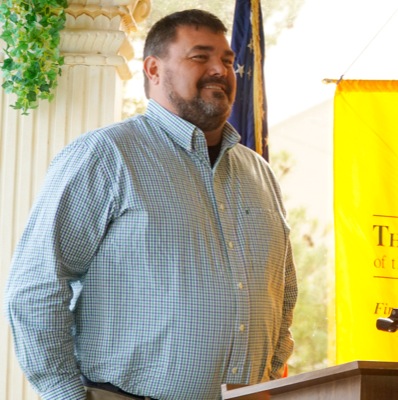Wednesday, November 23rd, 2016
Educator enjoys helping troubled students
By William Kincaid

Photo by William Kincaid/The Daily Standard
Mercer County Educational Service Center Alternative School Director Aaron Rose talks to Celina Rotarians on Tuesday afternoon about the strides made in his program to serve students' unique learning needs.
CELINA - In his first year as Mercer County Educational Service Center Alternative School director, Aaron Rose said he's been thrilled to watch troubled students rise to the challenges he's set.
With many students finding part-time employment at local restaurants and retailers and attendance rates surpassing prior years', Rose said his students are buying into the system on their way toward becoming responsible and accountable adults.
"Overall, it's been a delightful beginning of the year," Rose told Celina Rotarians on Tuesday afternoon. "Kids have shown that they can grow, they can be respectful and they do have the ability to be contributors to this town."
Rose, a 1995 Marion Local High School graduate now in his 16th year in education, took over the program housed in the Galleria in Celina after teaching sixth-grade science in Fort Loramie for 11 years. Prior to that, he spent four years in Miami County's alternative school teaching program.
Rose said he enjoys the challenge of working with students who have fallen behind to show them they do indeed have a future - a good future if they can get their act together.
The alternative school was created to serve the students' unique learning needs. Typically, a district school principal refers junior high and high school students to the program if they're struggling to keep up with coursework.
"The goal is to get their credits caught up and get them back on the right course to graduate. This year we've had one student graduate already," Rose said, noting two more students are in line to graduate.
In addition to Rose, the staff consists of a special education teacher, a teacher, an aide and a social worker, he said.
High school students attend one of two three-hour sessions while the junior high students go to alternative school all day, he said. He started the year with 20 students, 18 in high school and two in junior high. Enrollment has since risen to 30 students.
The junior high students learn all core subjects at the alternative school while their older peers do a majority of their work- history, English, science and elective courses - through an online program called GradPoint.
This year, though, Rose said he's instituted a change, pulling the students away from the computers to learn about math and life skills in a small-group setting. And it's proven to be a successful move.
"To me, sitting in front of a computer trying to understand math, it's difficult," he said. "So we pull them out, they go into a separate classroom and we teach anything from basic math to algebra II."
What excites Rose most is looking into a classroom of teens and watching as they ecstatically go to the board to demonstrate their skills.
"It's like a part of their life that they missed. They didn't have that opportunity (or) they didn't take advantage of that opportunity when they were younger," he said.
Rose said he's considering adding breakout sessions next year for science or social studies.
"The kids, they gravitate to the idea of sitting in a regular classroom and being able to participate like a regular student," he said.
An overwhelming majority of the students, Rose said, are meeting the course requirements, with some even excelling and prompting Rose to raise the bar higher. Some students, too, are getting to the point where they may return to their home schools.
"We work real well with, hand-in-hand with our probation officers. Yeah, we have a couple hiccups every once in a while, but it seems like it's getting better."
The attendance rate for the first semester has been 89 percent, which Rose considers "a huge success," given that some students in years past were missing as many as three days a week. Students are held accountable, he said. If they don't show up, the truancy officer will knock on their doors.
The students have shown a keen desire to find jobs. At the beginning of the year three students were employed. Now, 15 are working, Rose said, thanking the local businesses for giving them a chance.
"A lot of these kids, people view them as bad students," Rose said. "They're just missing guidance ... a little discipline, and I feel like we're giving that to them this year."
"They're finding that they don't have to continue down the path that they're going," he continued.
